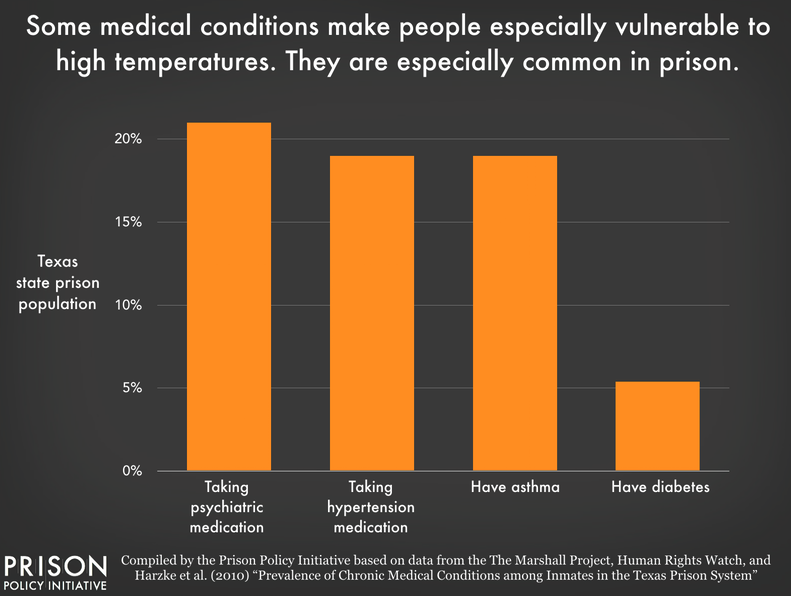Heat Can Be Deadly for Jail Inmates
At this time of year, many are excited for the change of season and cooler weather. This is especially true for inmates in the Southern states, or other areas of the country that are prone to extreme temperatures and heat waves during the summer months. For inmates in these areas, summer means months of enduring blistering and unescapable heat. A lack of Air Conditioning (AC), adequate ventilation, or even water and ice, often makes it impossible for inmates to find relief. Unfortunately, summer can be a dangerous time for inmates as they try to avoid heat illness, injury or even death.
Hazardous Heat and Humidity
In 44 states, universal air conditioning for the incarcerated is not provided or legally mandated. Air conditioning or cooling methods are often seen as an amenity or luxury. Without access to these “amenities”, inmates have no reprieve from the climbing summer temperatures.
The U.S. National Institute for Occupational Safety and Health (OSHA) has thresholds for identifying when humid heat exposure can be harmful.
- From 2016-2020, 27% of all days where the humid heat threshold was exceeded, came from county jails.
- Of all facilities where humid heat exposure thresholds were exceeded, 52% came from inmates in Texas and Florida.
- Inmates experienced more than 75 days of heat exposure annually in 118 facilities across California, Arizona, Texas and Florida.
- Facilities in Florida experienced the greatest increase in humid heat days, with 22.1 more days in 2020 than in 1982.
Cooking Inmates to Death
“Everyone understands that if you leave a child in a car on a hot day, there’s a serious risk this child could be injured or die. And that’s exactly what we’re doing when we leave prisoners locked in cells when the heat and humidity climb beyond a certain level.”
– David Fathi, director of the American Civil Liberties Union National Prison Project
Many wonder if they will survive their sentence at times given the extreme conditions faced during the summer months. From trouble breathing, to nausea and seizures, inmates find themselves feeling “cooked” and unable to find relief.
Facilities often have areas of respite where portions (like the Chapel) have extra fans or cooling, but it often is not enough. And the heat protocols in place to mitigate the effects of heat aren’t always fully implemented due to staffing or supply shortages.
To cope, some inmates resort to drinking toilet water and temperatures exceeding 120 degrees have been cited in legal proceedings. Many of these complaints are based on the premise that excessive temperatures constitute cruel and unusual punishment. The ill effects from heat in jails is hard to estimate, but it is suspected that likely 13% of incarcerated deaths during summer months could be due to heat.
Increased Risk of Heat Injury
Inmates frequently are at a greater risk of experiencing heat illness or injury. This is usually due to common medical conditions found in this population. Something as simple as taking certain medications, having asthma or diabetes can mean an inmate experiences quicker or more extreme effects from heat.
Prolonged exposure to heat in general can quickly create unsafe conditions for both inmates and staff leading to heatstroke, dehydration and damage to vital organs such as the liver, lungs, heart or kidneys.

At particular risk of heat injury are those without access to water. This can occur when inmates are in isolation, lockdown, or when there isn’t enough water to go around. Unfortunately, the mentally ill can sometimes forget to drink water, or even refuse water, which can cause dehydration and even death.
In Tarrant County, Texas, it was recently discovered that three prisoners died from thirst–with all three having a history of mental illness. And in Denton County, Texas–another inmate lost more than 100 pounds in 2-months culminating in his death due to dehydration and malnutrition. While the facilities argue it isn’t their responsibility to force an inmate to drink water–many contend that it is an important aspect of maintaining the physical health and safety of the incarcerated.
Access to water, an ability to cool off and better contend with the heat are basic human rights. And the senseless deaths or harm that come from not providing these resources is an avoidable tragedy. So if you or a loved one has faced challenges with heat exposure or illness while in jail, consider reaching out to one of our experienced attorneys to see if we can help.

